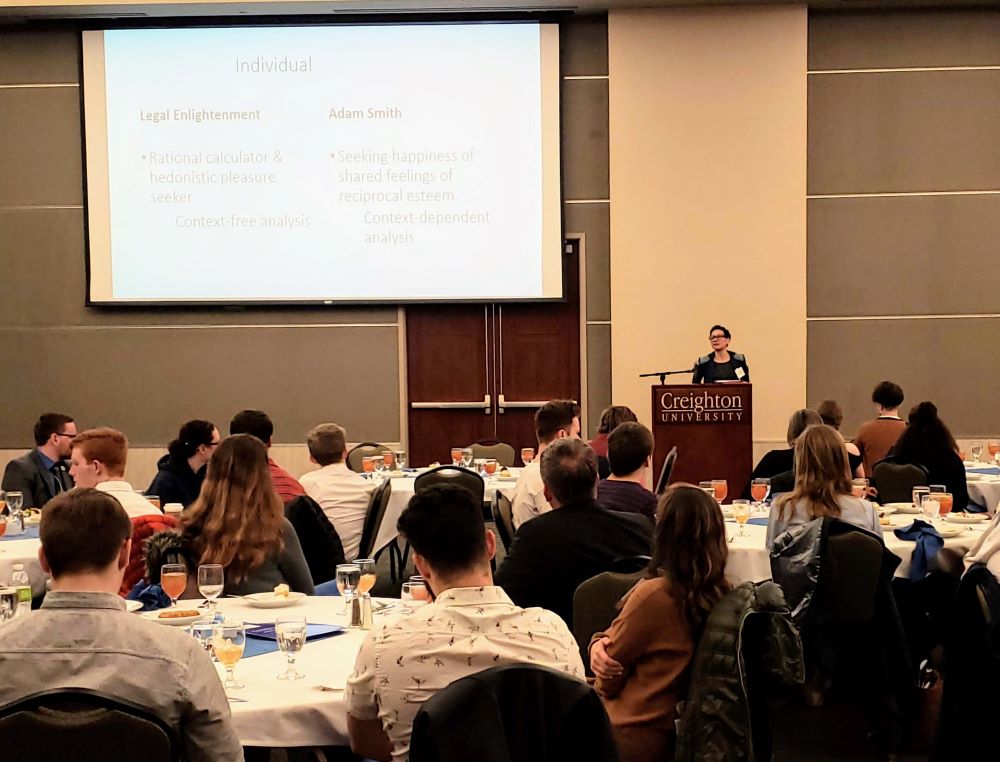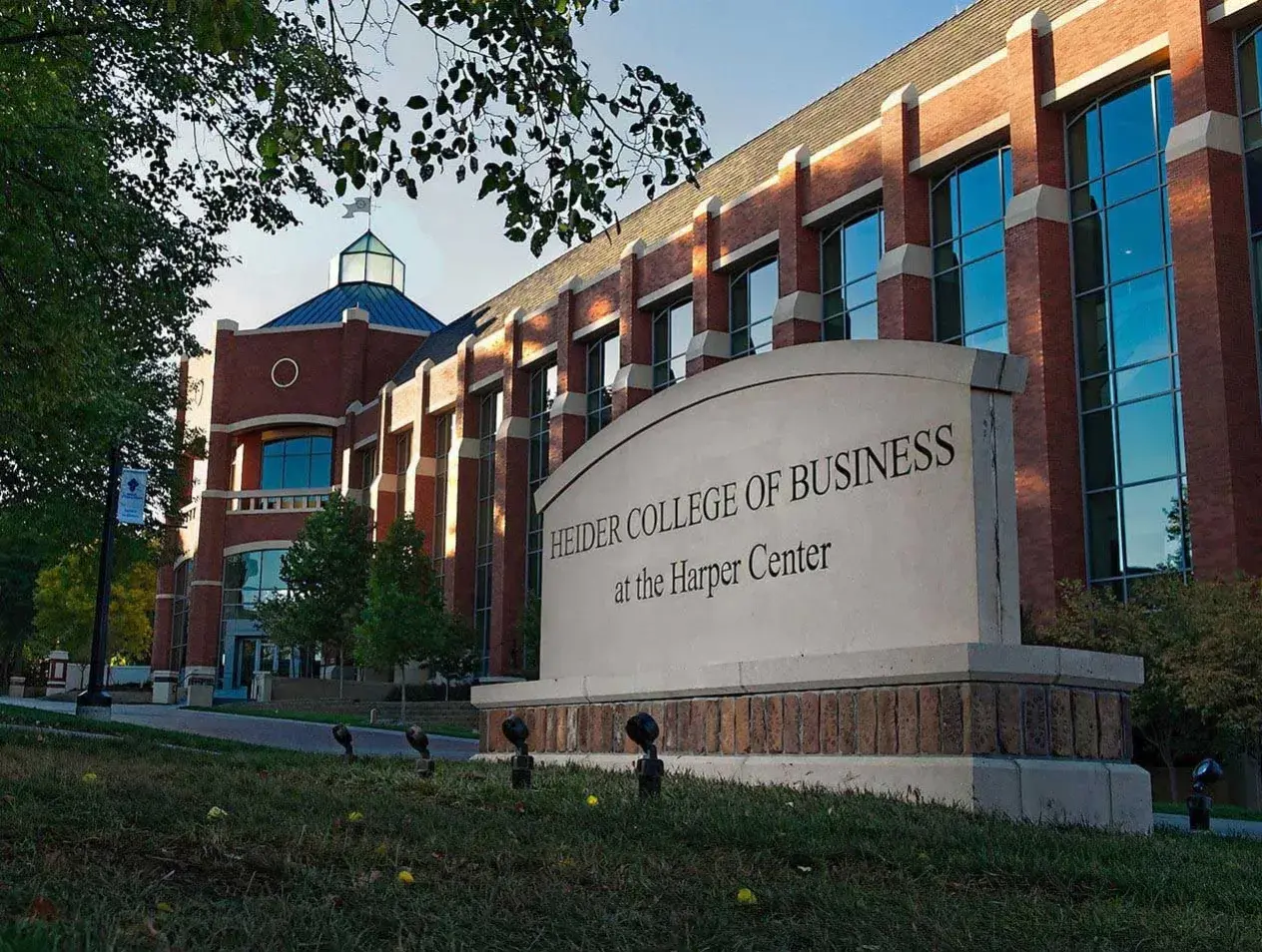
Humanomics
Humanomics Symposium
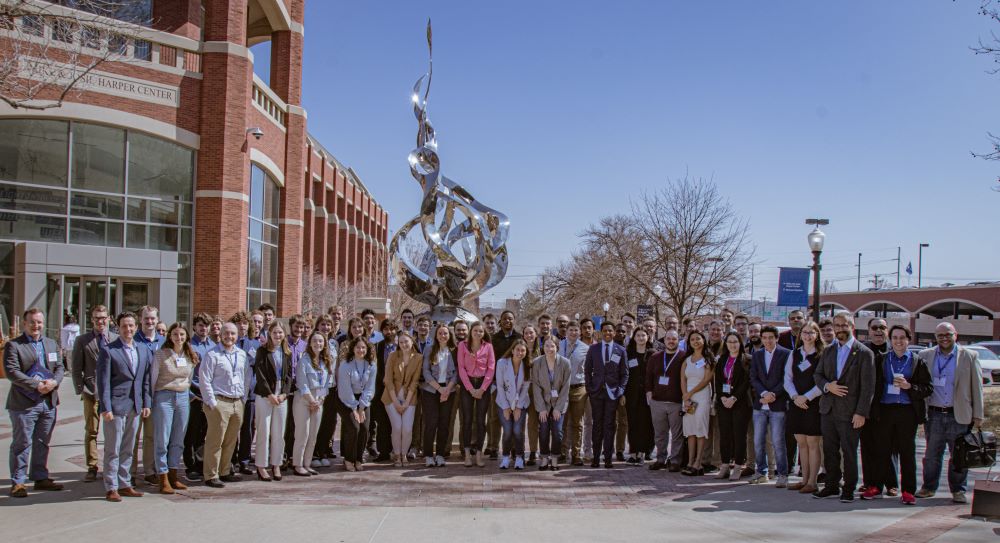
Join the annual Humanomics Symposium hosted by the Menard Family Center for Economic Inquiry, where students and faculty explore economics through a human-centered lens.
Information about the 2025 Humanomics symposium to come.
What is Humanomics?
- Microeconomics models human choice by focusing on rational self-interested action. In macroeconomics the individual is lost in aggregation. Economists struggle to model human behavior without taking these methodological short-cuts, leading to economic analysis devoid of a social context. Humanomics (as used by Smith and Wilson 2019) assumes that the messy working out of reciprocal relationships between individuals creates an economics that is more human. It relies on a modified structure of experimental economics, field work, evolutionary economic theory, and a more complex set of anthropological considerations. This complexity of analysis combines the best of economics with recognition of related social science fields of psychology, philosophy, political science, development, and sociology.
What does Adam Smith think about Humanomics?
- Adam Smith wrote The Wealth of Nations which is the book most people associate with the field of economics. He also wrote The Theory of Moral Sentiments. The Humanomics approach insists that a full understanding of economics requires that we pay attention to Smith’s insights in both books.
Where did Humanomics come from?
- Vernon Smith and Bart Willson wrote their book Humanomics: Moral Sentiments and the Wealth of Nations for the Twenty-First Century as a call to re-humanize economics. Their book has been the catalyst for the Humanomics approach.
Why not just modify the utility maximization framework?
Smith and Wilson (2019, p. 38) note that:
“Faced with a Paradox of Preferences, as revealed in choices, the economist’s instinct was to posit – like Adam Smith did for the Paradox of Value – that there must be two meaning of preferences: preferences for the self and preferences for the social, where the latter was expressed as different choices than the former. Three prominent publications appeal to “social preferences” as the solution to the paradox:”
- (Colin Camerer 2003, p.11)
- (Gary Charness and Matthew Rabin 2002, p. 817)
- (Ernest Fehr and Urs Fischbacher 2002, p. C1)
Smith and Wilson are not satisfied with this approach of merely modifying the utility-maximizing framework with a few “social” variables. They conclude that (p. 40), “The nature of the question about how Frank and Evelyn feel in social situations does not fit the analytical Max-U tool kit. Simply, put, utility maximization over outcomes only, is an inadequate and misapplied tool for the problem that Frank and Evelyn face in a personal social interaction.”
Smith, Vernon L., and Bart J. Wilson. 2019. Humanomics: Moral Sentiments and the Wealth of Nations for the Twenty-First Century. Cambridge: Cambridge University Press.
What is the Humanomics Symposium?
- The Humanomics Symposium is an annual gathering where students and faculty from around the country to discuss topics through the lens of Humanomics. The symposium is hosted by the Menard Family Center for Economic Inquiry. Groups of undergraduate students from universities around the country come to Omaha in March for the annual symposium.
What is the structure of the Humanomics Symposium?
- It begins late afternoon on a Friday and continues throughout the day Saturday.
- The symposium has an opening two to three plenary speakers.
- The core of the symposium is three breakout discussion sessions of a set of readings on the topic of the symposium that year.
Who should I contact for more information?
- Program Manager: Rafael Acevedo - rafaelacevedo@creighton.edu
- Director: Dr. Michael D. Thomas - michaelthomas@creighton.edu
Humanomics Symposium 2025: "Choosing a Career for both Personal and Professional Vocations"
Date: March 21/22, 2025
Time: Friday 4-9 pm - Saturday 8:00 am - 8:00 pm
Location: Harper Center
Director and Organizer: Dr. Michael D. Thomas - Creighton University
Opening Lecture Speaker & Panelist – Dr. Kimberly Eddleston - Northeastern University
Panel Moderator – Dr. Clara E. Piano - University of Mississippi
Panelist - Juliana Binhote - University of Louisville
Closing Lecture Speaker & Panelist - Dr. Angela Dills - Western Carolina University
Reading List
Session I: Professional Vocation
Eddleston, K. A., & Powell, G. N. (2012). Nurturing Entrepreneurs’ Work-Family Balance: A Gendered Perspective. Entrepreneurship Theory and Practice, 36(3), 513-541. https://doi.org/10.1111/j.1540-6520.2012.00506.x
Maddison, Eddleston, Keller, and Powel. (2021). Kinship and Gender in Family Firms: New Insights into Employees’ Organizational Citizenship Behavior. Family Business Review, 34(3): 270-29. DOI: 10.1177/08944865211008062
Catherine Porter and Danila Serra. (2020). Gender Differences in the Choice of Major: The Importance of Female Role Models. American Economic Journal: Applied Economics, 12(3): 226-54. DOI: 10.1257/app.20180426
Session II: School and Technology
Jonathan Haidt. Chapter 1: The Surge of Suffering, The Anxious Generation: How the Great Rewiring of Childhood is Causing an Epidemic of Mental Illness.
DeAngelis, C. A., & Dills, A. K. (2020). The effects of school choice on mental health. School Effectiveness and School Improvement, 32(2), 326–344. https://doi.org/10.1080/09243453.2020.1846569
Minda Jiang. (2023). The Impact and Potential of Educational Technology: A Comprehensive Review. Research and Advances in Education, 2(7), 32-49. doi:10.56397/RAE.2023.07.05
Session III: Career and Family Priorities
Claudia Goldin. Career and Family, Chapter 1 - The New Problem with No Name.
Catherine Pakaluk. Hanna’s Children: The Women Quietly Defying the Birth Dearth, Chapter 12 –The Road Not Taken.
Catherine Pakaluk. Hanna’s Children: The Women Quietly Defying the Birth Dearth, Chapter 14-Doing something else.
Topic: Innovation, Religion, and the State of the World
The Humanomics 2024 symposium gathered leading thinkers to explore the divisive narratives shaping today's world. Featuring keynote speakers Mr. Walter Russell Mead, Dr. Carson Holloway, and Dr. Rusty Reno, participants engaged in discussions on modernity, liberalism, and teleology, inspired by Mead’s essays and works by C.S. Lewis and R.R. Reno. With reading group sessions, public lectures, and even an optional scavenger hunt, the symposium offered a dynamic and insightful examination of how innovation and religion intersect with global politics and societal divides in the modern age.
Speakers: Mr. Walter Russell Mead - Bart College, Dr. Carson Holloway - University of Nebraska Omaha, and Dr. Rusty Reno - First Things Magazine.
Image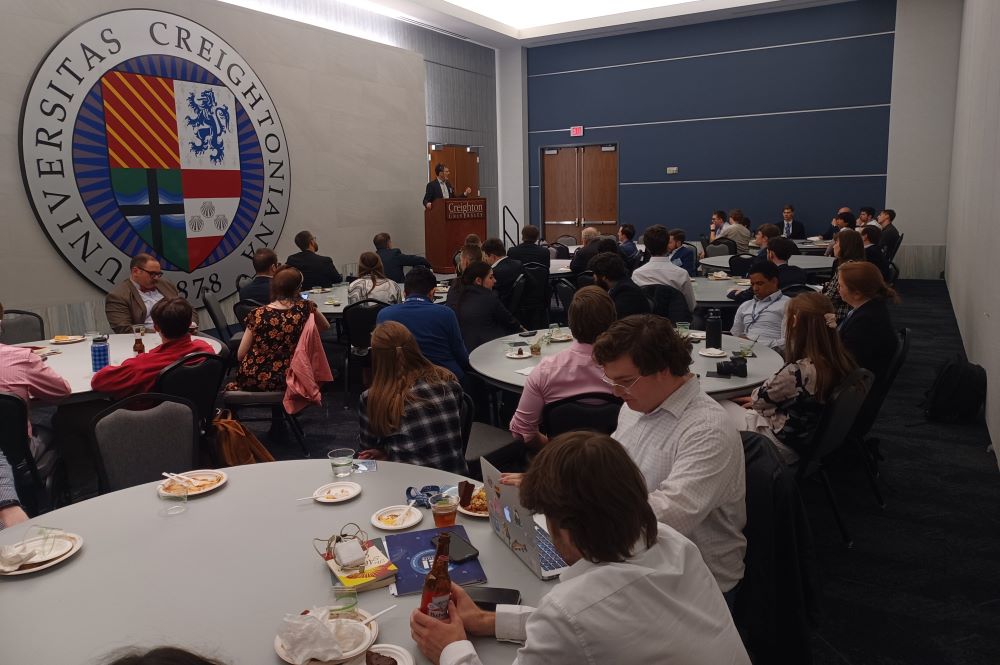
Topic: Economic & Political Freedom
The Humanomics 2023 symposium was a remarkable gathering that explored the foundational principles of liberty in modern societies. Directed by Dr. Michael D. Thomas from Creighton University, the event featured powerful keynote speakers like freedom activist Yeonmi Park and economist Dr. Vincent Geloso. Participants engaged with thought-provoking readings on topics ranging from the Hayek-Friedman hypothesis to the impact of economic freedom on women's well-being. Sessions explored the basics, workings, and benefits of freedom, offering deep insights into its role in economic development and political stability. Enriched by faculty panels, this symposium deepened the dialogue on freedom's global impact.
Speakers: Ms. Yeonmi Park - Best Selling Author, and Dr. Vincent Geloso - George Mason University
Image
Topic: Civil Society & Social Change
The Humanomics 2022 symposium, "Civil Society & Social Change," hosted by the Menard Family Center for Economic Inquiry, offered a rich exploration of social norms, fiscal decentralization, and urban governance. Participants delved into readings by scholars like Elinor Ostrom on collective action and Fehr and Fischbacher on human cooperation, sparking lively discussions. Keynote speakers Dr. Tony Gill and Dr. Vlad Tarko illuminated the themes of civil society and social change. In addition to the engaging sessions, attendees joined faculty panels, movie discussions, and a live podcast recording, all fostering deep academic inquiry into how societies organize and evolve.
Speakers: Dr. Anthony Gill - University of Washington, and Dr. Vlad Tarko - University of Arizona
Image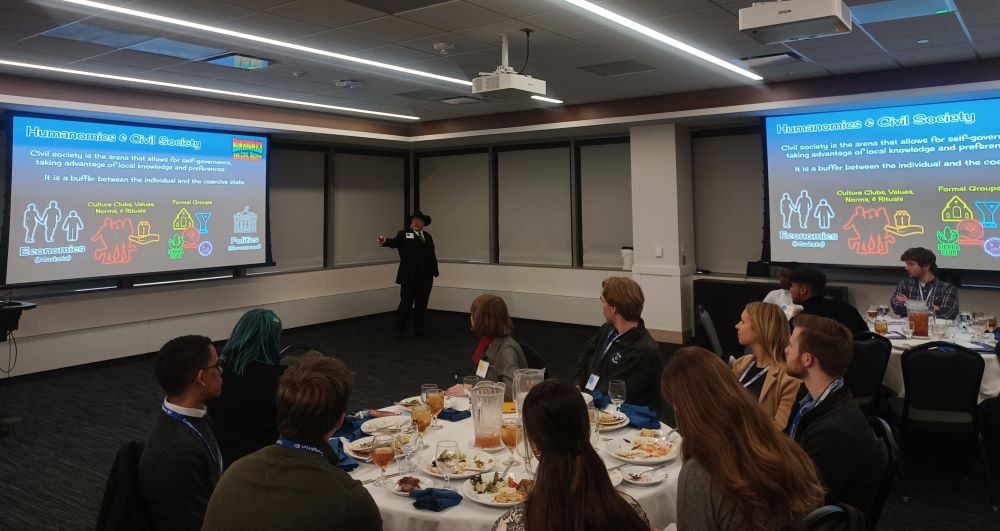
Topic: Smitihian Sentiments of Crime and Punishment
The inaugural Humanomics Symposium 2019 marked the launch of Humanomics as a flagship program of the Menard Family Center for Economic Inquiry. Humanomics, as conceptualized by Smith and Wilson (2019), assumes that the messy, reciprocal relationships between individuals create an economics science that is more human, moving beyond traditional models of rational self-interest. It blends experimental economics, fieldwork, evolutionary theory, and anthropology to create a more nuanced understanding of human behavior. The symposium, led by Dr. Maria Pia Paganelli, Dr. Derek Yonai, and Dr. Alexei Marcoux, explored morality, crime, and punishment through this interdisciplinary lens, integrating insights from psychology, philosophy, political science, development, and sociology.
Speakers:Dr. Maria Pia Paganelli - Trinity University;Dr. Derek Yonai - Emporia State University; and Dr. Alexei Marcoux - Creighton University.
Image